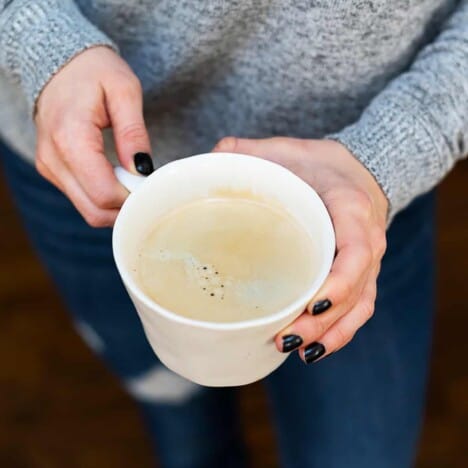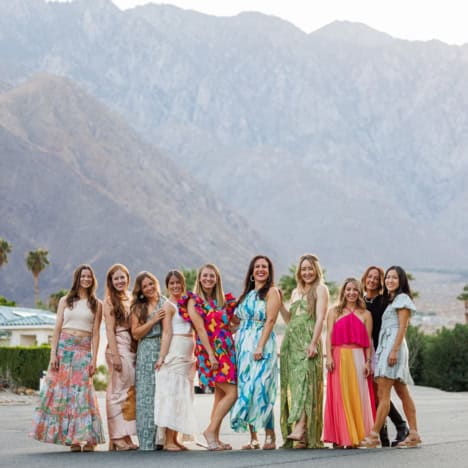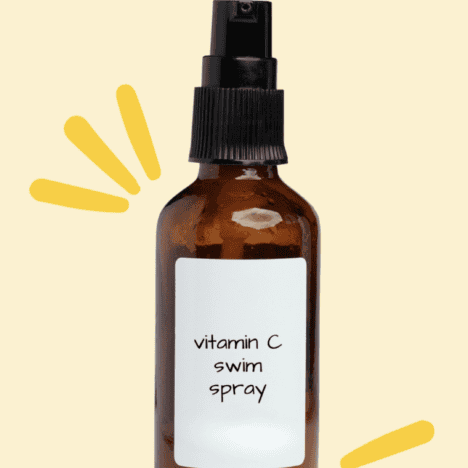This post may contain affiliate links. Please read my disclosure policy.
Everything You Need to Know About Coffee… is finally here! I’ve wanted to talk about the coffee industry for a long time now, because like with many industries that I’ve come to learn about, quality and sourcing matter, and we are so often sold misinformation. Knowledge is power, so today we’re doing a deep dive into the coffee industry so you can enjoy that (good-quality, cleaner) coffee!
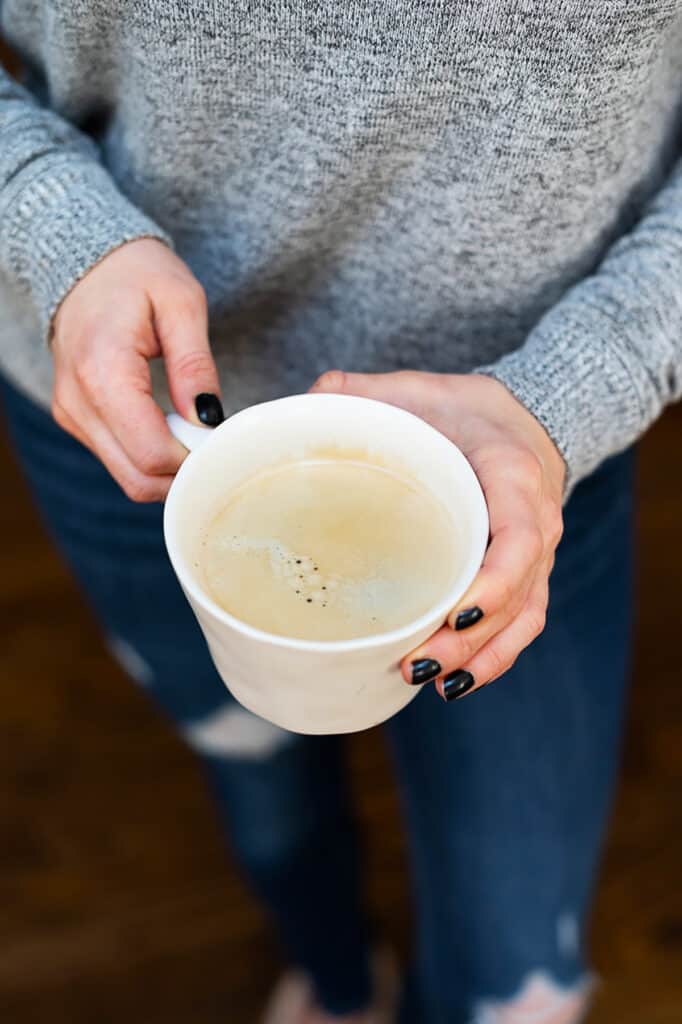
Everything You Need to Know About Coffee
Here’s what my personal coffee routine looks like: every morning, I drink one cup of coffee after having a glass of water. (This is the coffee machine I use. A newer model because mine is old)! I drink my coffee black and usually dissolve collagen peptides in it for improved skin, bone, gut, muscle, and heart health. When possible, I like to make my coffee moment a peaceful one so that I’m totally ready to take on the day when my cup is empty (or 3/4 of the way done).
I don’t like to miss this moment in my daily routine — and I bet you don’t, either! That being said, there’s a lot to learn about coffee and how to purchase and enjoy it in a way that offers maximum benefits for the health of your body, the environment, and our wider global community. As always, I want to share that knowledge with you to help you make the most informed decisions possible for yourself and your household.
According to a 2020 study by the National Coffee Association (yes — that’s a thing!), a whopping 62% of Americans drink coffee every single day, seven in ten Americans drink it once a week, and the average American coffee drinker indulges in just over three cups per day. If you feel like you’re reliant on coffee to get your day started (or to keep the momentum going) you’re not alone. And let’s be real — coffee is more than just a warm beverage with a nice dose of caffeine. It’s also an important ritual for so many of us!
That being said, there’s a lot to learn about coffee and how to purchase and enjoy it in a way that offers maximum benefits for the health of your body, the environment, and our wider global community. As always, I want to share that knowledge with you to help you make the most informed decisions possible for yourself and your household.
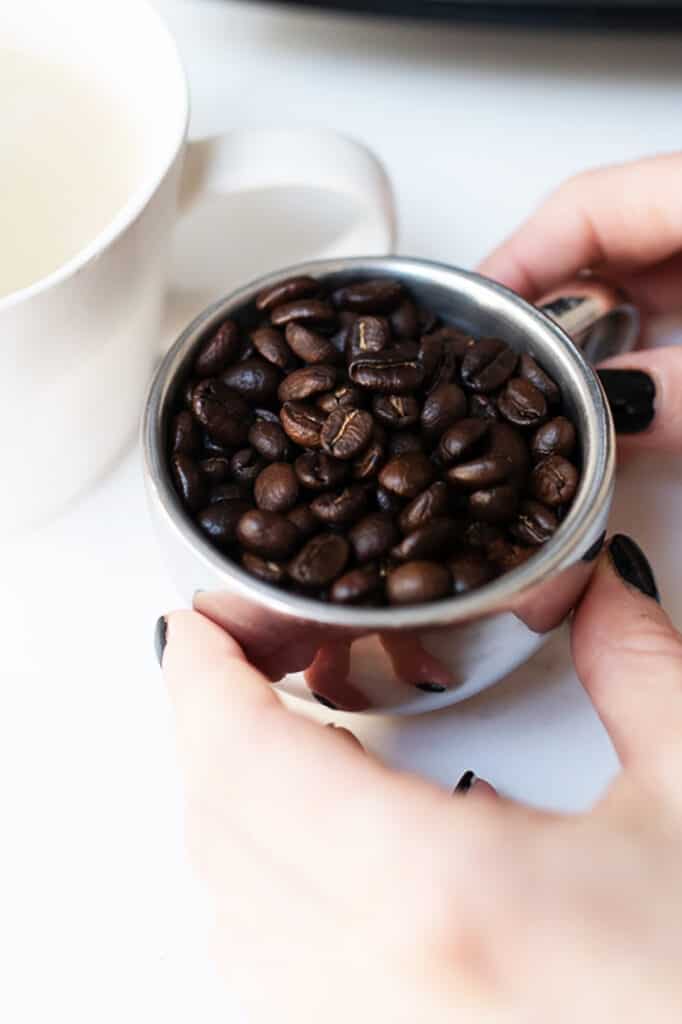
First of all…
I bet you’ve wondered if coffee is considered healthy.
I get it! If you’re making a lot of other informed decisions throughout the day with your health in mind, you probably don’t want to drink something on a regular basis that will be damaging for your health.
Before I go any further, though, an important reminder: I am a big believer in moderation across the board. Whether we’re talking about dessert or exercise or— in this case — coffee, it’s all about understanding the fine line between healthy balance and overindulgence, as well as listening to your body and knowing when enough is enough.
That being said, here are a few of the benefits of coffee, according to Healthline:
- It boosts your energy levels. Of course it does! Isn’t that why so many of us make it a non-negotiable part of our daily routines? As you probably know, it’s the caffeine present in coffee that causes this energy increase.
- Caffeine may also improve other brain functions. In addition to helping you wake up in the morning, caffeine has also been shown to improve memory, mood, vigilance, energy levels, reaction times, and general mental function.
- It can improve physical performance. Again, it all comes down to caffeine! Caffeine increases adrenaline levels and releases fatty acids from fat tissues, helping your body to perform at its best.
- Coffee contains essential nutrients, including riboflavin, pantothenic acid, manganese, potassium, magnesium, and niacin.
- It may lower your risk of Type 2 diabetes, Alzheimer’s disease, dementia, Parkinson’s disease, certain cancers, cirrhosis, and stroke Studies have shown a connection between coffee and a reduced risk of these conditions.
- Coffee is the biggest source of antioxidants in the Western diet. Experts have found that many people get more antioxidants from coffee than from the fruits and vegetables they consume (which might be a sign we should all be eating more fruits and vegetables!). As a reminder, antioxidants prevent or slow the damage that free radicals cause to cells, reducing the risk of many diseases in the process.
Those are some pretty substantial benefits! Still, it’s important to remember the importance of moderation, especially since caffeine has its fair share of negative side effects, including anxiety and disrupted sleep. When people become too dependent on caffeine, they might even experience withdrawal symptoms after missing a cup. It’s important to be mindful of how much coffee you’re consuming and if it’s making you jittery and anxious or interfering with your sleep.
According to Healthline, pregnant women and people who experience a lot of anxiety, high blood pressure, or insomnia should also be careful with their caffeine consumption.
With all of this talk about caffeine, you’re probably wondering about decaf! Is that a better option? It can be! I’ll share more on that later on.
Now that we’ve covered the health benefits (and drawbacks) associated with coffee, let’s chat about…
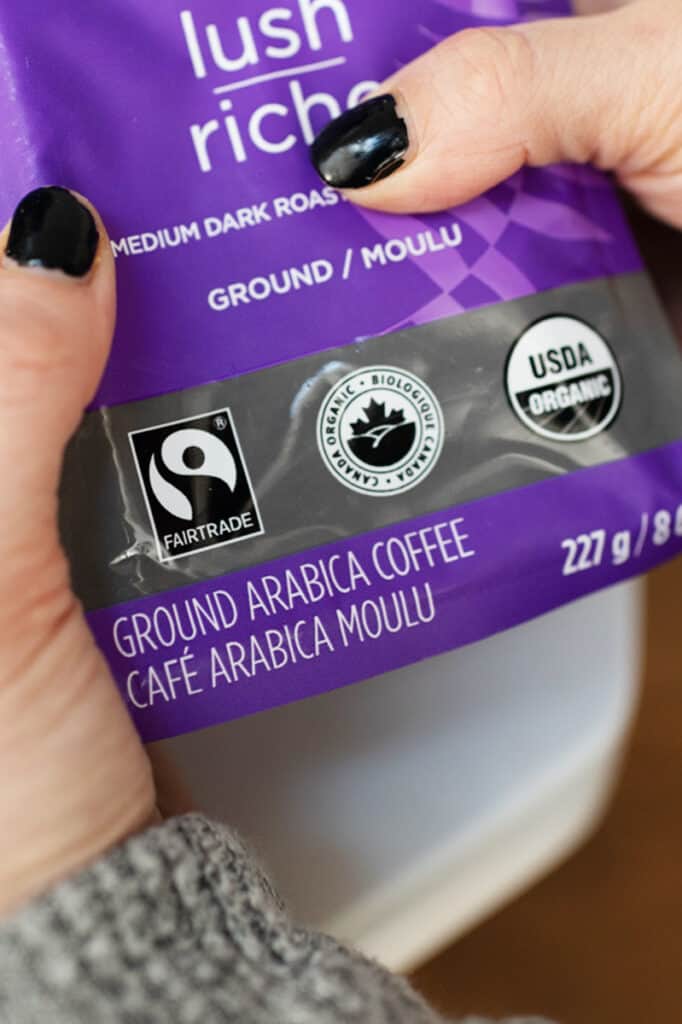
Best practices for buying coffee
The coffee industry is a complicated one that — like other big business — doesn’t always have your best interests at heart. Coffee is the world’s second largest crop, and many larger companies seek to capitalize on how much people love it by perpetuating growing practices that are actually damaging for consumers. In order to maximize profits, these companies use toxic chemicals (pesticides, insecticides, fungicides, etc.) and store and process their crops in a way that introduces additional toxins to the coffee, as well as to the environment. Plus, farm workers in the coffee industry are not always treated respectfully.
This doesn’t mean you have to give up your love of coffee… it just means you may want to be a little more thoughtful when shopping for your next cup of joe.
Here are a few things to look for when buying coffee that will help you avoid some of the more dangerous industry practices…
- Coffee that’s farmed in Ethiopia, Columbia, Kenya, Guatemala, Sulawesi, and Papua New Guinea. Why these countries? Because they are active coffee-farming areas that also have high-elevation, which means less mold growing on the beans. Coffee that takes longer to grow is subject to more mold, which may introduce naturally-occuring toxins called mycotoxins. In high amounts, mycotoxins can be carcinogenic (cancer-causing) and quite dangerous to both humans and animals.
- Coffee that’s processed using the wet method, rather than other natural processes. Other natural processes have been known to increase the number of mycotoxins.
What about organic coffee?
Shopping for organic coffee is also a good way to steer clear of some of the more damaging industry practices, specifically the use of pesticides and insecticides, as well as mycotoxins.
Organic coffee farmers do not use synthetic fertilizers or pesticides. They also grow their coffee in the shade, which encourages natural wildlife to flourish and offers a more tolerable working environment for the people harvesting the coffee in the fields. Governing bodies keep a close eye on organic coffee farming operations, so you can feel good about what you’re buying.
Plus, studies have shown a link between organic food and higher antioxidant content, so if you’re excited about the health benefits of drinking coffee, going organic certainly can’t hurt!
And what about coffee certifications?
If you’re a longtime coffee drinker, you might already be familiar with some of the certifications that are printed on coffee packaging. Here are a few certifications to look out for, along with basic descriptions of each:
- USDA Organic: Coffee sold with this certification must follow standards established by the USDA’s National Organics Program, which means that toxic and/or synthetic pesticides, fertilizers, and other chemicals are not allowed.
- Bird-Friendly: This “shade-grown” certification demonstrates that the coffee was grown in an area with at least 40% shade cover, and lots of tall trees.
- Rainforest Alliance: Coffee with the Rainforest Alliance certification has met the organization’s standards for community relations and fair treatment of workers.
- Fairtrade America: Products with this label meet an international standard that is only available to democratically-organized coops and small farm organizations.
- Fair Trade USA: Fair Trade USA is a certifier of fair trade coffee, which prioritizes sustainable and equitable trade relationships, along with high social and environmental standards.
It never hurts to support local coffee roasters.
I like to shop local whenever possible and coffee is no exception! Local roasters tend to be more educated about the products they carry and more accountable to their customers, which means they’ll lean away from coffees loaded up with chemicals and mycotoxins.
Here are a few clean brands to check out:
- Blue Bottle Coffee
- Ethical Bean Coffee
- Charleston Coffee Roasters
- New Harvest
- Purity Coffee
- Natural Force Coffee
- Bulletproof Coffee
- Kion Coffee
- Peak Performance Coffee
- Lifeboost Coffee
- Mindful Coffee
Here are some great beans and companies I’ve found doing it right if you want to give them a try.
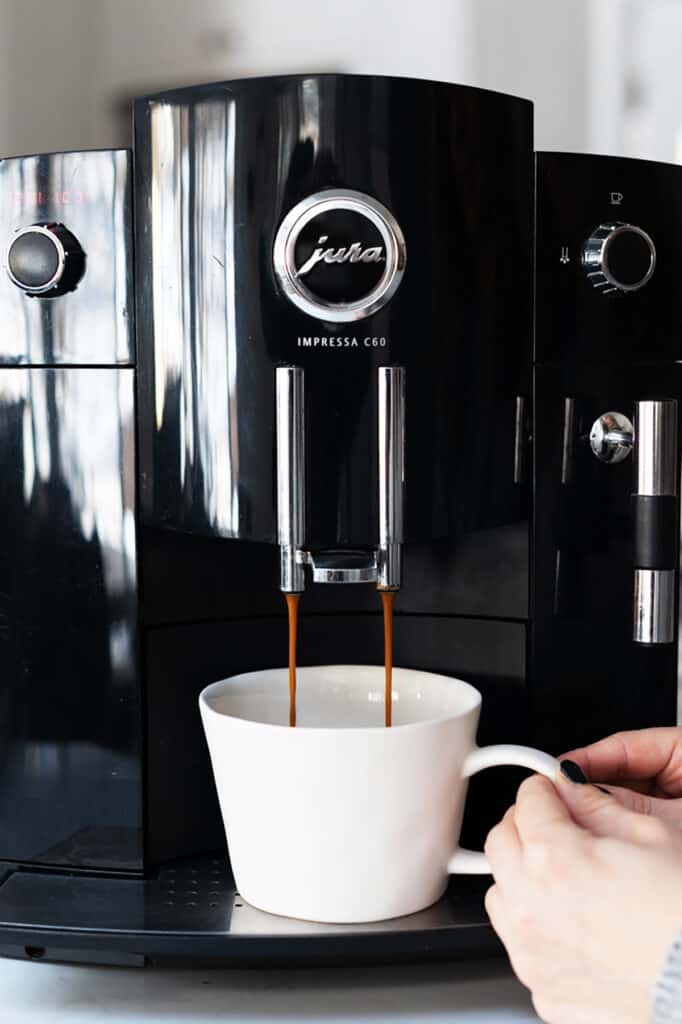
But what about decaf?
I told you we’d get back to the decaf of it all!
As you may have gathered from the beginning of this post, caffeine is the cause of a lot of the negative side effects associated with coffee. Caffeine is a stimulant that naturally occurs in plants, including coffee beans. Different coffee beans and preparations have different levels of caffeine.
In order to make decaf coffee, caffeine is removed from coffee beans when the beans are still green, after they’ve been harvested but before roasting. There are different methods used to do this, the cleanest of which is called the Swiss Water Process. This trademarked process removes caffeine without the use of Methylene chloride solvents, which are involved in other decaffeinating processes. The USDA says that these solvents don’t pose an explicit health risk, but I still think it’s best to purchase decaf made with the Swiss Water Process when possible. I want to avoid as many additional chemicals as possible, thank you very much!
What’s in Your Tap Water
And it’s more than just the coffee itself…
The subject of clean, safe water is a much bigger one, but it’s relevant here, as well, since if you’re making coffee at home, you’ll need to brew it with water.
Before you use tap water, I would highly recommend taking a look at this ‘Guide to Safe Drinking Water’ from the Environmental Working Group. You can also get a home water testing kit from many home supply and hardware stores, review your local water quality report, or get an independent lab test. This is another topic I feel really strongly about, so you can bet we’ll dive into this topic soon!
If your tap water is not safe (or can be safer) for drinking and you’re using it to brew your coffee, it really doesn’t matter how clean or safe the coffee itself is. In that case, you should look for a filtration system. What is accessible for your home may look different than what works for mine, so it may be worth using EWG to find out about your town’s water, and deciding the best solution from there!
Storing Your Coffee
Once you’ve found coffee that you feel good about, it’s important to know how to keep it fresh in your home.
First of all, it’s best to buy whole beans whenever you can! Whole beans are fresh when you buy them, while pre-ground might already be slightly stale. Plus, if you grind your own beans, you can switch up the grind size to change the coffee’s flavor.
Here’s a handy guide to how long you can store coffee in its most popular forms…
- Whole beans should be used within three or four weeks.
- Ground coffee is best when used within two weeks of opening.
Coffee is best preserved when stored in sealed packaging and a cool, dry place. Freezing your beans is not recommended, because moisture is not good for coffee.
Enjoy your coffee, friends!
